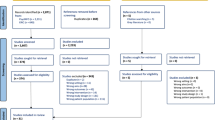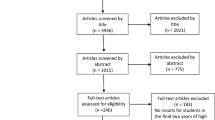Abstract
One of the aims of this study is to examine whether the worst experiences and most troublesome mathematics classroom experience affect mathematics anxiety in pre-service elementary teachers. Another goal is to find out how the causes of their anxiety relate to these negative experiences. The participants were 167 senior elementary pre-service teachers. Three different instruments were used to collect data; Mathematics Anxiety Rating Scale, Worst Experience and Most Troublesome Mathematics Classroom Experience Reflection Test, and Interview Protocol. The findings show that many pre-service teachers have mathematics anxiety and that the worst experience and the most troublesome mathematics classroom experience have a direct influence on mathematics anxiety in pre-service teachers. Also, the majority of instances of participants’ mathematics anxiety are caused by the teachers, their behavior or teaching approaches in their past.
Similar content being viewed by others
References
Aksit, N. (2007). Educational reform in Turkey. International Journal of Educational Development, 27(2), 129–137.
Andrew, P. B. (2004). Decreasing math anxiety in college students. College Student Journal, 38(2), 321–323.
Ashcraft, M. H., & Faust, M. W. (1994). Mathematics anxiety and mental arithmetic performance: An exploratory investigation. Cognition and Emotion, 8, 97–125.
Babadoğan, C., & Olkun, S. (2006). Program development models and reform in Turkish primary school mathematics curriculum. International Journal for Mathematics Teaching and Learning. [Online]: http://www.cimt.plymouth.ac.uk/journal/default.htm.
Bandalos, D. L., Yates, K., & Thorndike-Christ, T. (1995). The effects of math-self-concept, perceived self-efficacy, and attributions for success and failure on test anxiety. Journal of Educational Psychology, 87(4), 611–624.
Bekdemir, M. (2007). The causes of mathematics anxiety in elementary preservice teachers and proposals for decreasıng mathematics anxiety (the example of faculty of erzincan education). Journal of Erzican Education Faculty, 9(2), 131–144.
Bogdan, R. C., & Biklen, S. K. (1992). Qualitative research for education. Boston: Allyn and Bacon.
Brady, P., & Bowd, A. (2005). Mathematics anxiety, prior experience and confidence to teach mathematics among preservice education students. Teachers and Teaching, 11(1), 37–46.
Bulut, M. (2007). Curriculum reform in Turkey: A case of primary school mathematics curriculum. Eurasia Journal of Mathematics, Science & Technology Education, 3(3), 203–212.
Bursal, M., & Paznokas, L. (2006). Mathematics anxiety and pre-service elementary teachers’ confidence to teach mathematics and science. School Science and Mathematics, 106(4), 173–179.
Bush, W. S. (1989). Mathematics anxiety in upper elementary teachers. School Science & Mathematics, 89, 499–509.
Butterworth, B. (1999). The mathematical brain. London: Macmillan. Fennema.
Çakıroğlu, E., & Çakıroğlu, J. (2003). Reflections on teacher education in Turkey. European Journal of Teacher Education, 26(2), 253–264.
Erktin, E., Dönmez, G., & Özel, S. (2006). Psychometric characteristics of the mathematics anxiety scale. Education and Science, 31(140), 26–33.
Erol, E. (1989). Prevalence and correlates of math anxiety in Turkish high school students. Unpublished master thesis. Istanbul: Bogazici University
Fennema, E., & Sherman, J. A. (1976). Fennema-Sherman mathematics attitude scales: Instruments designed to measure attitudes toward the learning of mathematics by females and males. JSAS: Catalog of Selected Documents in Psychology, 6(2),(31), (Ms. No. 1225).
Frank, M. L. (1990). What myths about mathematics are held and conveyed by teachers? Arithmetic Teacher, 37(5), 10–12.
Greenwood, J. (1984). My anxieties about math anxiety. Mathematics Teacher, 77, 662–663.
Gresham, G. (2007). A study of mathematics anxiety in pre- service teachers. Early Childhood Education Journal, 35(2), 181–188.
Hadfield, O. D., & Lillibridge, F. (1991). A hands-on approach to the improvement of rural elementary teacher confidence in science and mathematics. Nashville, TN: Annual National Rural Small Schools Conference. (Eric document reproduction service No. ED 334082).
Hadfield, O. D., & McNeil, K. (1994). The relationship between Myers-Briggs personality type and mathematics anxiety among pre-service elementary teachers. Journal of Instructional Psychology, 21(4), 375–384.
Harper, N. W., & Daane, C. J. (1998). Causes and reduction of mathematics anxiety in pre-service elementary teachers. Action in Teacher Education, 19(4), 29–38.
Hembree, R. (1990). The nature, effects, and relief of mathematics anxiety. Journal of Research in Mathematics Education, 21, 33–46.
Jackson, C. D., & Leffingwell, R. J. (1999). The role of instructors in creating mathematics anxiety in students from kindergarten through college. Mathematics Teacher, 92, 583–586.
Kılıç, A. (2010). Learner-centered micro teaching in teacher education. International Journal of Instruction, 3(1), 77–100.
Ma, X. (1999). A meta-analysis of the relationship between anxiety toward mathematics and achievement in mathematics. Journal for Research in Mathematics Education, 30(5), 520–540.
Ma, X., & Xu, J. (2004). The causal ordering of mathematics anxiety and mathematics achievement: A longitudinal panel analysis. Journal of Adolescence, 27(2), 165–179.
McMillan, J. H., & Schumacher, S. (2006). Research in education: Evidence-based inquiry. London: Pearson (Sixth Edition).
Miller, L. D., & Mitchell, C. E. (1994). Mathematics anxiety and alternative methods of evaluation. Journal of Instructional Psychology, 21(4), 353–358.
Morris, J. (1981). Math anxiety: Teaching to avoid it. Mathematics Teacher, 74, 413–417.
National Council of Teachers of Mathematics. (1989). Curriculum and evaluation standards for school mathematics. Reston, VA: Author.
Norwood, K. S. (1994). The effects of instructional approach on mathematics anxiety and achievement. School Science and Mathematics, 94, 248–254.
Özgün-Koca, S., & Şen, A. İ. (2006). The beliefs and perceptions of pre-service teachers enrolled in a subject-area dominant teacher education program about “effective education”. Teacher and Teaching Education, 22, 946–960.
Perry, A. B. (2004). Decreasing mathematics anxiety in college students. College Student Journal, 38(2), 321–324.
Richardson, E., & Suinn, R. M. (1972). The mathematics anxiety rating scale: Psychometric data. Journal of Counseling Psychology, 19(6), 551–554.
Sloan, T., Daane, C. J., & Giesen, J. (2002). Mathematics anxiety and learning styles: What is the relationship in elementary pre-service teachers? School Science & Mathematics, 102(2), 84–87.
Stuart, B. V. (2000). Mathematics curse or mathematics anxiety? Teaching Children Mathematics, 6, 330–335.
Tooke, D. J. L., & Leonard, C. (1998). Effectiveness of a mathematics methods course in reducing mathematics anxiety of pre-service elementary teachers. School Science & Mathematics, 98(3), 136–142.
Trujillo, K. M., & Hadfield, O. D. (1999). Tracing the roots of mathematics anxiety through in-depth interviews with pre-service elementary teachers. College Student Journal, 33, 219–232.
Wood, E. F. (1988). Mathematics anxiety and elementary teachers: What does research tell us? For Learning of Mathematics, 8(1), 8–13.
Yıldırım, A., & Şimşek, H. (2005). Sosyal bilimlerde nitel araştırma yöntemleri [Qualitative research methods for the social sciences]. Ankara: Seckin Yayıncılık.
Yüksel-Şahin, F. (2008). Mathematics anxiety among 4th and 5th grade Turkish elementary school students. International Electronic Journal of Mathematics Education, 3(3), 179–192.
Zakaria, E., & Nordin, N. M. (2008). The effects of mathematics anxiety on matriculation students as related to motivation and achievement. Eurasia Journal of Mathematics, Science &Technology Education, 4(1), 27–30.
Acknowledgements
I would like to thank Dr. Vehbi Aytekin Sanalan for her thoughtful comments and advice, which have really helped me through the writing of this paper. I would also like to thank Dr. Stephen J. Pape whose comments and feedback helped me with my earlier drafts.
Author information
Authors and Affiliations
Corresponding author
Rights and permissions
About this article
Cite this article
Bekdemir, M. The pre-service teachers’ mathematics anxiety related to depth of negative experiences in mathematics classroom while they were students. Educ Stud Math 75, 311–328 (2010). https://doi.org/10.1007/s10649-010-9260-7
Published:
Issue Date:
DOI: https://doi.org/10.1007/s10649-010-9260-7




